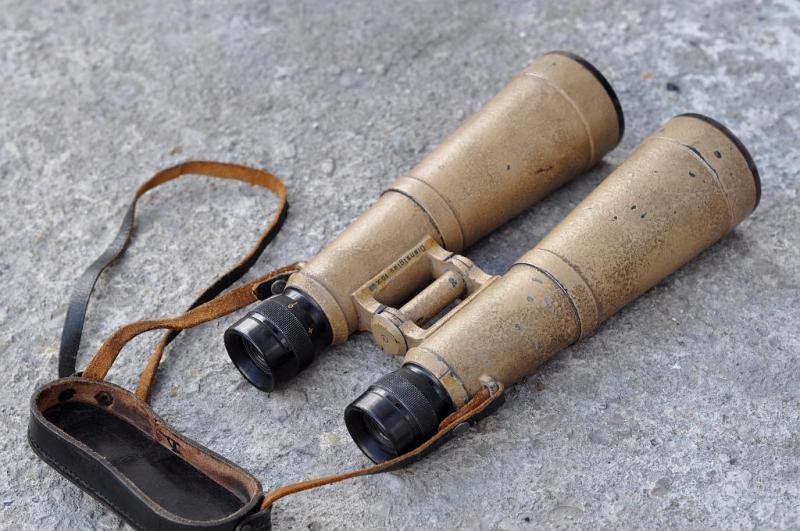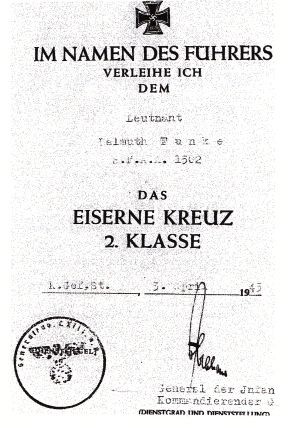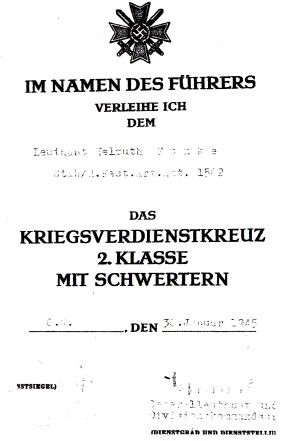The following story took place in the Ruhr Valley of Germany in April 1945.
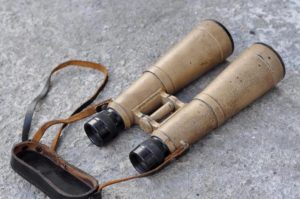 This is a pair of WWII German Afrika Korps artillery spotter binoculars. They were labelled “Dienstglas.” They were powerful and well-made field glasses with a magnification power of 10.
This is a pair of WWII German Afrika Korps artillery spotter binoculars. They were labelled “Dienstglas.” They were powerful and well-made field glasses with a magnification power of 10.
On one occasion in April 1945, I, and another soldier, had entered a German artillery spotter’s location, and had taken its occupants prisoners. After the capture, I had returned to the location and retrieved a pair of these dienstglas’s and carried them with me through the balance of my combat duty time.
Below is a picture of me in May 1945, taken when I had an opportunity to check out the remnants of Hermann Goering’s elaborate villa at Berchesgaden, Bavaria.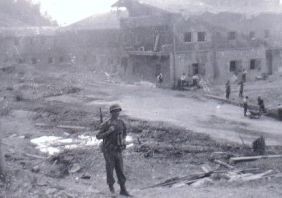
The dienstglas are draped around my neck in this picture. I wore them everywhere. I was able to view the last remaining days of WWII through those special and powerful glasses. They gave me two additional sets of lenses from which to view. They were with me right up until about 10 years ago, when they mysteriously disappeared.
Their two views are metaphors for duty and respect. Duty in the form of sacrifice and obedience. Respect in the form of acceptance and brotherhood.
It is a reference to viewing life through different lenses. Specifically, close up views and at the other end of the binoculars a distant, all encompassing, views. Both are helpful to view life as a balance between goods and bads.
Up close, exact. Far away, a perspective.
In our return to Germany’s Ruhr Valley, Steve and I were able to return to a place where my WWII Dienstglas acquisition happened. Several new variables then entered into our long viewing range. A new perspective was achieved. There was a lot more to be seen in 2017, than there was in 1945.
First, the huge valley where some 300,000 German troops surrendered had been transformed from a dismal gray to an active green. Peace had returned. Prosperity was evident. People were welcoming instead of frightened and hostile. I could not find the artillery spotter house, but assumed it, too, if still existing would not be being used for its wartime purpose. Altogether a more promising view than that of 1945.
Peaceful surroundings result from peaceful actions. A peaceful place is a result of forgiveness. Forgiveness is a major step to brotherhood. Forgiveness works in many ways. One way is restoration. A restoration of a broken relationship to one of reconciliation. We have spent the last 72 years restoring relationships with our German brethren. We have helped them tear down walls. We have fed them. They have become better in so many ways, as have we, as a result. It would behoove each of us to keep this process alive and growing. Steve and I discussed this as we were observing the good changes that we set out to record on our trip to bad days past.
The upshot of this discussion was that I realized that I needed to give back the medals I had retrieved from the same person whose Dienstglas I had taken.
This is the citation for the Iron Cross I took from Lt. Helmuth Funke:
I am currently engaged in the process of restoring these medals to Lt. Funke, if he is still alive, or to those of his survivors.
This is the citation for the Kriegsverdeinstkreuz I took from Lt. Funke:
When completed, these will be my contributions to restoration and reconciliation. I will thank Lt. Funke and/or his family for that opportunity, and be better for it.
My experience at Luneville was a changing point in the intentions of these stories. They no longer represent a fulfillment of a long-standing bucket list, but rather, another voice being raised to restore our lost brotherhood.
Please consider using Relighting.Us to add yours. We will all be better for it…
